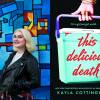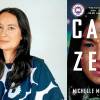No. 1 New York Times bestseller Emily Henry is famous for her tear-inducing romantic novels. Her latest novel, “Happy Place,” centers around longtime couple Harriet and Wyn. Though they broke up months before their yearly getaway with friends, they decide to pretend they’re still together in order to hang onto a tradition that makes them feel happiest. Stuck being closer than ever, the couple can’t ignore their pull to each other, while also grappling with the reasons they broke up in the first place.
Henry’s books, which center on women dealing with pivotal changes in their lives, can be found on recommendation lists and favored by celebrities like Drew Barrymore. Her three previous romances (“Beach Read,” “People We Meet on Vacation” and “Book Lovers”) are all being turned into movies. With an active social media presence (270,000 Instagram followers and counting) and more than 10 million views on TikToks about her books, she is at the top of the industry.
Henry spoke with GBH News about the novel, out today, April 25, and her growing success. Excerpts from the interview are below, and you can hear the full interview below.
Haley Lerner: Where did you get the first inkling of an idea for “Happy Place”?
Emily Henry: I was watching a bunch of comedies of remarriages, which are a subgenre of movies from the '40s that were basically like these ridiculous, screwball romantic comedies that were being used to get around these decency and morality codes that were being enforced upon Hollywood. They would have the couple actually split up so that they could have them flirting or considering other relationships, and it wouldn't be portraying infidelity. And then they'd get back together at the end.
I love those movies as a viewer so much. They seem like such a fun, silly concept. So I thought that would be really fun to take into writing “Happy Place.” I thought I'd be writing this screwball comedy. And then when I was writing about a couple who'd been together for so long and then broken up, I just couldn't really find a way to thrust them together that felt as slapstick as it did in my mind. I was like, "This is actually pretty devastating for these people." I think that's why this book might make readers cry.
Lerner: When writing your main characters, Harriet and Wyn, who are exes, how do you balance the level of hurt that they each caused each other while also leaving room for forgiveness?
Henry: For this book I found myself so often thinking you have to push deeper and It wasn't necessarily fun as a writer to take every scene and go so deep into how Harriet felt about it and what she's thinking about it. But I knew that I had to do it because this is such a heightened reality situation I put them in, but I wanted it to feel real and possible.
I also had one pass of the draft that was entirely about adding jokes. And I actually did the same thing with “Book Lovers,” because both books weren't as funny as I wanted them to be, especially this one, because there is this heavier undercurrent to Harriet's feelings. Once I had the main story down and I understood the emotional arc and what hurt for them, I did go back through to make a whole draft devoted to making it funnier and seeing where the tension could veer more into the ridiculous.
Lerner: Your book features a dynamic friend group and cast of characters. How do you make these characters real, and the relationships feel lived in?
Henry: I wrote a lot of scenes — that didn't make it into the book — between the characters so that I could see their dynamic outside of the main storyline and also how they worked in smaller subgroups. Some of that made it into the book, but a lot of it didn't.
I figured out in the fourth draft that I needed to give Harriet a one on one scene with everyone. It didn't need to be long, but I needed to see how she interacted in conversation with each individual friend because it would be slightly different. I felt that they needed some page time where it's just Harriet and this person and you see how they work together.
Lerner: This book deals with struggling with your life and career choice and choosing overall what makes you happy in life. How did you write this sort of second coming of age for adults in the book?
Henry: I think every book I've done has had that to an extent. I sort of think that my books are often reactions to the book that I just wrote. So with “Book Lovers,” Nora [the protagonist] is really career-oriented and she wants to live in the city. And her journey is really about just self-acceptance and affirmation of what she wants.
I think it was natural for me to next write about someone who was not sure of her career, because I think there are people whose career is the most important thing to them. And I'm one of those people because writing is one of the most important things to me, and that happens to be my career. But there are a lot of people who that's not true for, and I think that's just as valid.
That kind of arc worked into the story of “Happy Place,” these characters asking what they actually want and avoiding the trap of "What should I be doing?" "Where should I be?" Instead, they’re thinking, "Where do I want to be?" "What do I want to be doing?" And that just happens really naturally.
Lerner: This is your first romance that's being released in hardcover. And your work keeps blowing up more and more. Is there a pressure you feel as an author as you watch your success grow?
Henry: I think it's really uncommon and rare for any author to ever get to have this level of visibility, but especially for me to have gotten to have it for several books now. There is definitely a part of me that's afraid of letting the readers down. Every single book that I come out with, I'm just like, I don't want this to be the one that they hate. There's always going to be readers who love a book and hate a book, and that's OK.
It is really strange and daunting and surreal, and I'm trying to just really enjoy everything that comes with being at this crest of the wave and then if and when it pulls back, hopefully finding ways to enjoy that too. You can just keep writing books you believe in, and readers will either want them or they won't.
Lerner: Three of your books are in the works to become movies. Is there anything you can share on that topic?
Henry: I read what was close to the final script for “People We Meet On Vacation” and it is so beautiful. I cried the first draft that I read of it just because it was such a strange, surreal and magical experience to see someone else write something at that level that it's like sort of fan fiction, but they're doing it better than you are. And it's a really moving and miraculous feeling. The script has just gotten better with every draft. It's so good. It feels so real and grounded. I think it's the kind of story that I, as a rom-com lover, have been dying for from Hollywood.
Lerner: What do you hope people get out of “Happy Place”?
Henry: With “Happy Place,” I really want people to feel like it's OK to change your mind about what you want to do. Your identity is not based on what you do. It's who you are. I just want people to feel affirmed in their choices to do whatever would actually make them happy instead of what they think they're supposed to want.








